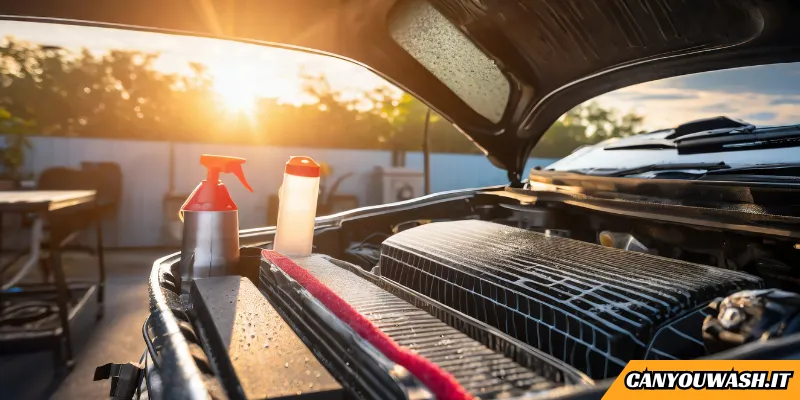Yes, you can wash an engine bay, and doing so can help prevent corrosion, remove grime, and enhance the overall appearance. However, it requires a careful approach to avoid potential damage to sensitive components.
Your vehicle’s engine bay, often neglected in regular cleaning routines, plays a crucial role in your car’s overall maintenance and performance. But the question arises: “Can you wash an engine bay?”
I’ll provide a clear and knowledgeable answer to this common query in this guide. I’ll explore the dos and don’ts of washing an engine bay and provide a step-by-step guide to ensure a safe and effective cleaning process.
Dos and Don’ts of Washing Engine Bay
Dos
- Do ensure that the engine is cool before starting the cleaning process to prevent rapid drying of cleaning agents and potential damage.
- Do cover sensitive components such as the air intake, electrical components, and exposed filters with plastic bags or waterproof covers to protect them from water and cleaning agents
- Do use a suitable engine degreaser to break down stubborn grease and grime. Follow the product instructions for the correct application and dwell time.
- Do use a soft-bristle brush to agitate the degreaser and lift dirt.
- Do thoroughly rinse the engine bay with a hose or pressure washer, ensuring all degreaser and dirt residues are washed away.
- Do use a clean microfiber towel to dry the engine bay thoroughly, especially around electrical components, to prevent water spots.
- Do apply a thin coat of petroleum jelly or battery terminal protectant to the battery terminals after cleaning to prevent corrosion.
Don’ts
- Don’t attempt to wash the engine bay while the engine is hot, as rapid cooling can lead to potential damage and cracking of hot components.
- Don’t use high-pressure water directly on sensitive electronic components. Instead, use a gentle stream or avoid direct spraying altogether.
- Don’t use abrasive brushes or scouring pads, as they can scratch surfaces and damage delicate components.
- Don’t overuse degreaser, as it can lead to residues that may attract dirt and grime.
- Don’t skip covering sensitive components. Water and cleaning agents can damage electronics, sensors, and other delicate parts.
Step-by-Step Guide on How to Wash an Engine Bay
Step 1
Cool the Engine
Ensure the engine is cool before starting.
Step 2
Cover Sensitive Components
Cover the air intake, electrical components, and exposed filters with plastic bags or waterproof covers.
Step 3
Apply Degreaser
Spray a suitable engine degreaser on dirty areas. Follow product instructions for application and dwell time.
Step 4
Submerge the Band
If the band is removable, submerge it in the lukewarm water. Use a soft brush for scrubbing if needed.
Step 5
Use a Soft Brush
Agitate the degreaser with a soft-bristle brush to lift dirt and grime.
Step 6
Thoroughly Rinse
Rinse the engine bay thoroughly with a hose or pressure washer, ensuring all residues are washed away.
Step 7
Dry with a Towel
Use a clean microfiber towel to dry the engine bay, paying attention to electrical components.
Step 8
Protect Battery Terminals
Apply petroleum jelly or battery terminal protectant to prevent corrosion on battery terminals.
Step 9
Put Back Any Covers or Parts
Once the engine area is dry, you can put back any covers or parts that you took off before.
You May Like: Can You Wash Your Engine?
FAQs
Can washing the engine bay improve fuel efficiency?
While cleaning the engine bay won’t directly impact fuel efficiency, it can prevent dirt and grime buildup, allowing the engine to operate more efficiently and potentially contribute to maintaining optimal performance.
Will washing the engine bay affect the warranty of my vehicle?
Generally, washing the engine bay won’t void the vehicle’s warranty. However, following the manufacturer’s guidelines and avoiding high-pressure water on sensitive components is essential.
How often should I wash my engine bay?
The frequency of engine bay cleaning depends on various factors, including driving conditions and climate. Generally, a thorough cleaning every six months is recommended, but more frequent cleaning may be necessary in harsh environments.
Can I use household cleaning products to wash the engine bay?
It’s best to use products specifically designed for engine bay cleaning, such as degreasers formulated for automotive use. Household cleaning products may not be suitable and could potentially harm sensitive components.
Are there any environmental concerns associated with washing the engine bay?
Washing the engine bay outdoors can lead to runoff containing oil, grease, and cleaning agents. It’s advisable to use biodegradable and eco-friendly products and wash the vehicle on surfaces that can capture and filter runoff.
Can engine bay cleaning help identify leaks or issues?
Yes, a clean engine bay makes it easier to spot oil or fluid leaks, loose hoses, or damaged components. Regular cleaning allows for better visual inspection during routine maintenance.
Can I wash the engine bay of an electric vehicle?
Electric vehicles have fewer traditional engine components, but it’s still possible to carefully clean the engine bay. Avoid direct water exposure to electronic components and follow the manufacturer’s guidelines.
Are there professional services available for engine bay cleaning?
Yes, some automotive detailing services offer engine bay cleaning. Ensure they use suitable products and methods to protect sensitive components.
Final thoughts 💭
In conclusion, washing your engine bay is a beneficial maintenance practice that can enhance the longevity and appearance of your vehicle.
Following the dos and don’ts outlined in this article and using a careful step-by-step approach can ensure a clean engine bay without compromising sensitive components.
Regular cleaning not only improves aesthetics but also contributes to your vehicle’s overall health and performance.





Leave a Reply